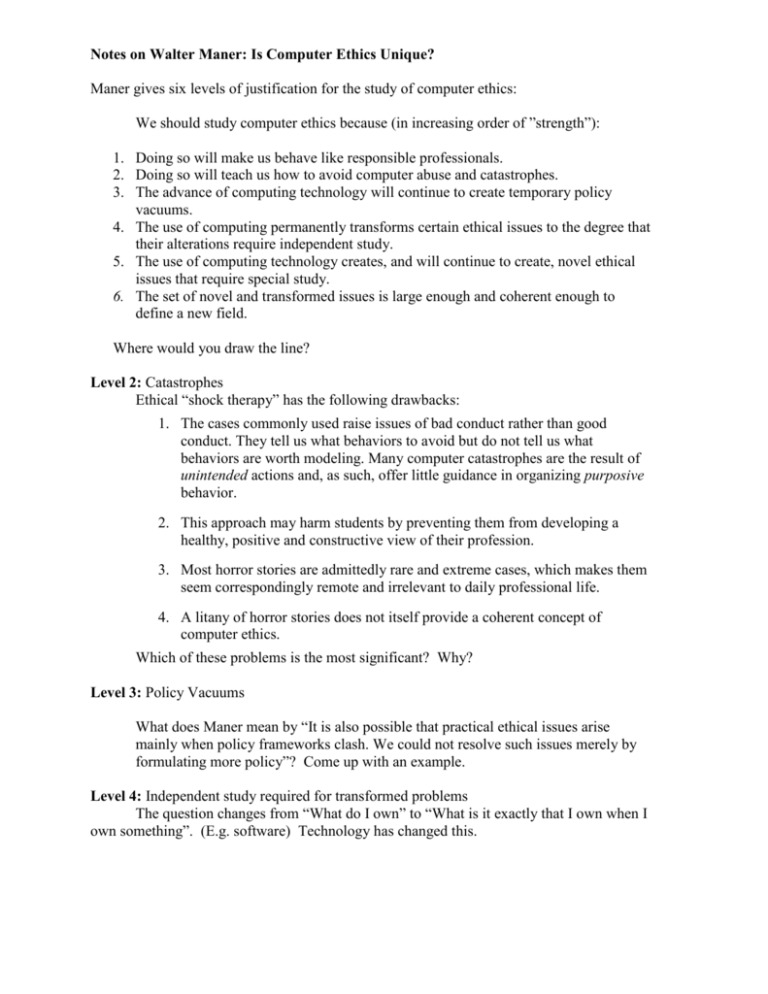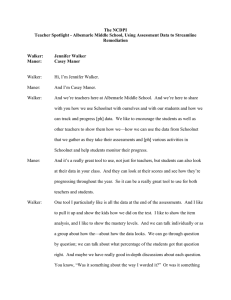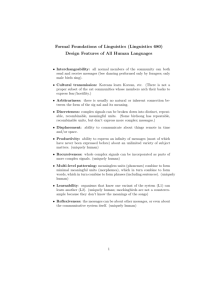Notest on Walter Maner: Is Computer Ethics Unique
advertisement

Notes on Walter Maner: Is Computer Ethics Unique? Maner gives six levels of justification for the study of computer ethics: We should study computer ethics because (in increasing order of ”strength”): 1. Doing so will make us behave like responsible professionals. 2. Doing so will teach us how to avoid computer abuse and catastrophes. 3. The advance of computing technology will continue to create temporary policy vacuums. 4. The use of computing permanently transforms certain ethical issues to the degree that their alterations require independent study. 5. The use of computing technology creates, and will continue to create, novel ethical issues that require special study. 6. The set of novel and transformed issues is large enough and coherent enough to define a new field. Where would you draw the line? Level 2: Catastrophes Ethical “shock therapy” has the following drawbacks: 1. The cases commonly used raise issues of bad conduct rather than good conduct. They tell us what behaviors to avoid but do not tell us what behaviors are worth modeling. Many computer catastrophes are the result of unintended actions and, as such, offer little guidance in organizing purposive behavior. 2. This approach may harm students by preventing them from developing a healthy, positive and constructive view of their profession. 3. Most horror stories are admittedly rare and extreme cases, which makes them seem correspondingly remote and irrelevant to daily professional life. 4. A litany of horror stories does not itself provide a coherent concept of computer ethics. Which of these problems is the most significant? Why? Level 3: Policy Vacuums What does Maner mean by “It is also possible that practical ethical issues arise mainly when policy frameworks clash. We could not resolve such issues merely by formulating more policy”? Come up with an example. Level 4: Independent study required for transformed problems The question changes from “What do I own” to “What is it exactly that I own when I own something”. (E.g. software) Technology has changed this. The special status of Computer Ethics: Consider Maner’s description of “unique” ethical issues and problems that: are characterized by the primary and essential involvement of computer technology, exploit some unique property of that technology, and would not have arisen without the essential involvement of computing technology Apply these criteria to your chosen class project/presentation/paper. Does it qualify? Uniqueness: Maner writes that computer technology is unique in the following ways: Unique Storage: (16-bit number). The fact that a number can overflow can be catastrophic. This does not occur on paper, for instance. Uniquely Malleable: "they can be shaped and molded to do any activity that can be characterized in terms of inputs, outputs, and connecting logical operations." As a technology that has transformed society, are computers different from books? Uniquely Complex: Do you agree with Maner’s statement: “There are mathematical functions describing such forces as thrust and lift, and these forces behave according to physical laws. There are no corresponding laws governing the construction of computer software.” Uniquely fast: What are examples of computer’s speed destabilizing effects? (stock market, defense, news, control, …) Uniquely cheap: What analog to “cent-slicing” can you think of? Uniquely cloned: Is there a non-computer analog to this? Uniquely discreet: A single bit change can change everything. Maner (and Dijkstra) comment that “This discontinuous and disproportionate connection between cause and effect is unique to digital computers and creates a special difficulty for consequentialist theories”. Does this affect your views of what the the year 2030 will look like? Uniquely coded: Information is organized in layers. What are examples you know of where you had data stranded? Do you agree that machines can bury a culture?









